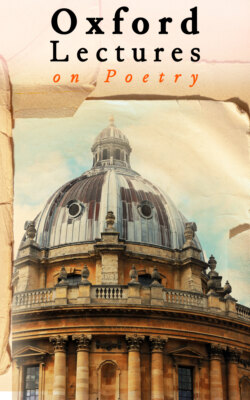Читать книгу Oxford Lectures on Poetry - A. C. Bradley - Страница 12
На сайте Литреса книга снята с продажи.
NOTE G
ОглавлениеThis new question has ‘quite another sense’ than that of the question, What is the meaning or content expressed by the form of a poem? The new question asks, What is it that the poem, the unity of this content and form, is trying to express? This ‘beyond’ is beyond the content as well as the form.
Of course, I should add, it is not merely beyond them or outside of them. If it were, they (the poem) could not ‘suggest’ it. They are a partial manifestation of it, and point beyond themselves to it, both because they are a manifestation and because this is partial.
The same thing is true, not only (as is remarked in the text) of the other arts and of religion and philosophy, but also of what is commonly called reality. This reality is a manifestation of a different order from poetry, and in certain important respects a much more imperfect manifestation. Hence, as was pointed out (pp. 6, 7, note B), poetry is not a copy of it, but in dealing with it idealises it, and in doing so produces in certain respects a fuller manifestation. On the other hand, that imperfect ‘reality’ has for us a character in which poetry is deficient,—the character in virtue of which we call it ‘reality.’ It is, we feel, thrust upon us, not made by us or by any other man. And in this respect it seems more akin than poetry to that ‘beyond,’ or absolute, or perfection, which we want, which partially expresses itself in both, and which could not be perfection and could not satisfy us if it were not real (though it cannot be real in the same sense as that imperfect ‘reality’). This seems the ultimate ground of the requirement that poetry, though no copy of ‘reality,’ should not be mere ‘fancy,’ but should refer to, and interpret, that ‘reality.’ For that reality, however imperfectly it reveals perfection, is at least no mere fancy. (Not that the merest fancy can fail to reveal something of perfection.)
The lines quoted on p. 26 are from a fragment of Shelley’s beginning ‘Is it that in some brighter sphere.’
1. The lecture, as printed in 1901, was preceded by the following note: “This Lecture is printed almost as it was delivered. I am aware that, especially in the earlier pages, difficult subjects are treated in a manner far too summary, but they require an exposition so full that it would destroy the original form of the Lecture, while a slight expansion would do little to provide against misunderstandings.” A few verbal changes have now been made, some notes have been added, and some of the introductory remarks omitted.
2. Note A.
3. Note B.
4. What is here called ‘substance’ is what people generally mean when they use the word ‘subject’ and insist on the value of the subject. I am not arguing against this usage, or in favour of the usage which I have adopted for the sake of clearness. It does not matter which we employ, so long as we and others know what we mean. (I use ‘substance’ and ‘content’ indifferently.)
5. These remarks will hold good, mutatis mutandis, if by ‘substance’ is understood the ‘moral’ or the ‘idea’ of a poem, although perhaps in one instance out of five thousand this may be found in so many words in the poem.
6. On the other hand, the absence, or worse than absence, of style, in this sense, is a serious matter.
7. Note C.
8. This paragraph is criticized in Note D.
9. Note E.
10. Not that to Schiller ‘form’ meant mere style and versification.
11. Note F.
12. Note G.
13. In Schiller’s phrase, they have extirpated the mere ‘matter.’ We often say that they do this by dint of style. This is roughly true, but in strictness it means, as we have seen, not that they decorate the mere ‘matter’ with a mere ‘form,’ but that they produce a new content-form.
